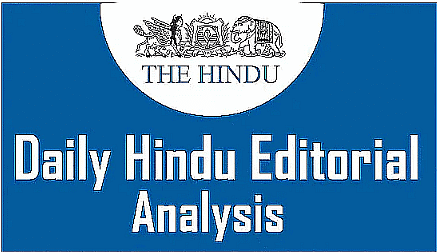The Hindu Editorial Analysis- 1st July 2024 | Current Affairs & Hindu Analysis: Daily, Weekly & Monthly - UPSC PDF Download

Weaponising PMLA
Why in News?
The grant of bail to former Jharkhand Chief Minister and Jharkhand Mukti Morcha leader Hemant Soren exposes the questionable practice of the Enforcement Directorate in slapping money-laundering cases just to arrest political adversaries of the ruling dispensation.
Enforcement Directorate (ED) Overview
- Agency Nature: Domestic law enforcement and economic intelligence agency.
- Responsibilities: Enforcing economic laws and combating economic crimes in India.
- Origin: Formed in May 1956 as an "enforcement unit" for Exchange Control Laws violations under the Foreign Exchange Regulation Act, 1947. Renamed as the Enforcement Directorate in 1957.
- Nodal Ministry: Department of Revenue, Ministry of Finance.
Objectives of the ED
- Key Acts Enforced:
- Foreign Exchange Management Act, 1999 (FEMA)
- Prevention of Money Laundering Act, 2002 (PMLA)
- Fugitive Economic Offenders Act, 2018 (FEOA)
About Prevention of Money Laundering Act, 2002 (PMLA)
- Enactment: January 2003.
- Objectives:
- Prevent and control money laundering.
- Confiscate and seize property obtained from laundered money.
- Address issues related to money laundering in India.
- Definition of Money Laundering: Involvement in any process or activity connected with proceeds of crime, projecting it as untainted property (Sec. 3).
Amendments to PMLA
- 2009 and 2012: Amended by the Prevention of Money Laundering (Amendment) Acts.
- 2015, 2018, 2019: Amended through Finance Acts.
Powers of the ED under PMLA
- Investigative Powers: Sections 48 & 49 empower ED officers to investigate money laundering cases.
- Summons: Section 50(2) empowers ED to summon individuals for evidence or records.
- Obligation to Attend: Section 50(3) mandates summoned individuals to attend and make truthful statements.
- Property Confiscation: Special powers under the PMLA.
Supreme Court Rulings (2022)
- Endorsement: Supreme Court upheld ED's powers, emphasizing its role in preventing money laundering.
- Clarification: ED officials are not equivalent to police officers and cannot make arrests under the PMLA.
- Adherence to Rule of Law: Importance of checks and balances in ED operations highlighted by the court.
News Summary
- Supreme Court's Stand: Endorsed ED's powers to summon "anybody for any information."
- Incident: Four Tamil Nadu District Collectors reprimanded for failing to appear in response to ED summons.
- Reason for Absence: Collectors cited the upcoming General Elections in Tamil Nadu and requested more time.
- Court Order: Collectors ordered to appear before ED on April 25, with a case hearing listed for May 6.
Respite may still elude a beleaguered community
Why in News?
In November 1888, Lord Dufferin (1826-1902) wrote, ‘Muslims of British India, a nation of 50 million reigned supreme from the Himalayas to Cape Comorin’. In contemporary India, the Muslim demographic has swelled to more than fourfold since Lord Dufferin’s era. It now surpasses the combined populations of Britain and France.
Introduction
Lord Dufferin was a well-known Victorian socialite and British government official. Today, he is best renowned for being one of history’s most influential diplomats. He achieved the apex of his diplomatic career in 1884 when he became the eighth Viceroy of India. Lord Dufferin served as Viceroy and Governor-General of India from 1884 until 1888.
Significant Events During Lord Dufferin's Tenure
1886: Third Burmese War
- Background:
- Lord Dalhousie had previously seized lower Burma.
- King Thebau controlled upper Burma as a sovereign nation.
- French Influence:
- King Thebau signed a trade agreement with France, raising British concerns.
- Conflict with British Interests:
- The King arrested company officials and imposed heavy penalties on the Bombay Burma Trading Company.
- Lord Dufferin requested an investigation, which was rejected by the King.
Incident in Panjdeh (1885)
- Context: Russia's expansion into Afghanistan.
- Russian Actions:
- In 1884, Russians captured Merv Oasis and later claimed Panjdeh.
- War Preparations:
- Both Russia and the United Kingdom prepared for potential war.
- Diplomatic Resolution:
- Lord Dufferin's diplomacy successfully averted the war.
Foundation of Congress (1885)
- Initiative:
- Allan Octavian Hume received consent from the Viceroy to establish the Indian National Congress in May 1885.
- Opening Meeting:
- Presided by Womesh Chandra Bonnerjee.
- A resolution was adopted calling for council reforms and expressing dissatisfaction with the governance structure.
- Legislative Outcome:
- Lord Dufferin formed a committee to oversee council changes, resulting in the Indian Councils Act of 1892, introducing the concept of representation in India.
Evaluation of His Tenure
- Challenges:
- Dufferin faced a psychological and political dilemma as Lord Ripon's successor.
- Indians had great affection for Ripon, while Anglo-Indians disliked him.
- Dufferin needed the support of both communities to govern effectively.
- Successes:
- Successfully navigated the rift caused by Lord Ripon's reforms.
- Utilized his diplomatic skills to ease racial tensions heightened by the Ilbert Bill.
- His governance was characterized as "an imperial embassy rather than an orthodox government."
Conclusion
Lord Dufferin earned a lot of respect as a scholar. After leaving public life, he rose to the positions of Rector of Edinburgh and St. Andrew’s and President of the British Geographical Society. Due to his personal enlightenment, Dufferin was awarded various honorific titles, including DCL, LLD, FRS, and Doctor of Oriental Learning (Punjab University).
|
39 videos|4108 docs|861 tests
|
|
39 videos|4108 docs|861 tests
|

|
Explore Courses for UPSC exam
|

|

















